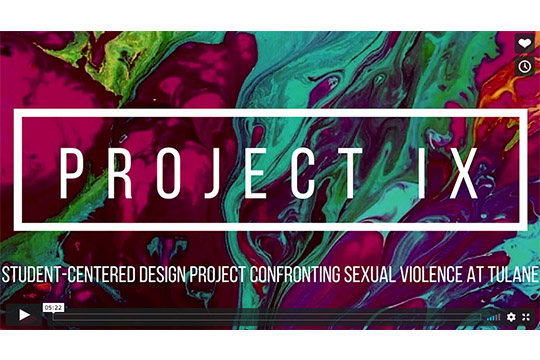Dear Tulane Community:
I am continually awed by our students. Wednesday, however, took me to a new level as I spent the morning attending a remarkable presentation of student-designed solutions to the problem of sexual assault at Tulane University.
These solutions, many of which Tulane intends to fund, were the class projects of students enrolled in a new course launched this spring called Project IX: Student Design to End Sexual Assault, which was offered by the Phyllis M. Taylor Center for Social Innovation and Design Thinking. The ideas presented Wednesday morning were as bold and forward-thinking as our students. They ranged from using specially-themed Tarot cards to facilitate conversations with victims of sexual assault to training students to become peer advocates and help survivors navigate the reporting and conduct process, as well as access support services offered by the university. There were also great ideas to identify and empower influencers among student leaders and campus organizations so that they might inspire a change in Tulane's culture to one of consent, respect and justice.
Other projects were aimed at fostering discussions on sexual health, healthy relationships, LGBTQ+ issues and more. Peer mentorships, a restorative justice effort, art installations on issues such as sex positivity and buttons, flyers and signage driving home the message of consent were all part of the mix of innovative ideas. The video below offers a glimpse into the design process of Project IX.
In addressing the results of last spring's Climate Survey, we have turned to leading experts from universities and institutions throughout the country, some of whom attended Project IX classes. They, too, were impressed by our students' insight, creativity, depth of knowledge and level of involvement in sexual assault prevention. Like me, our national experts believe that the best hope of becoming the community we all strive for and deserve lies in the wisdom, passion and purpose of our students.
Scholarly rigor, energy, determination and commitment typified this week's presentation by our students, many of whom were sexual assault survivors themselves. But there was also a palpable sense of joy in the room as the students discussed their ideas. This unexpected joy seemed to spring from a collective knowledge that the scourge of sexual assault will neither define nor overwhelm us, but will be the catalyst for our transformation through education, justice and true community.

